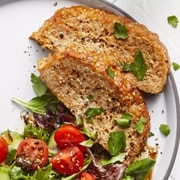Are these oils really poisoning you? Dietitians weigh in on RFK Jr.’s shocking claim
- Replies 0
Seed oils: Are they the dietary villain of the 21st century, or just another misunderstood ingredient caught in the crossfire of America’s ever-evolving food debates?
If you’ve been scrolling through social media lately, you’ve probably seen headlines and hot takes—most recently from Robert F. Kennedy Jr.—declaring that seed oils are “poisoning” Americans.
But before you toss out your canola and sunflower oil, let’s take a closer look at what the science (and the experts) actually say.
Seed Oils Under Fire: What’s the Fuss?
Seed oils—think canola, corn, soybean, sunflower, safflower, cottonseed, grapeseed, and rice bran—are everywhere.
They’re in salad dressings, mayonnaise, granola bars, protein bars, baked goods, and even your favorite potato chips. They’re the go-to for deep-frying at fast food joints and the secret ingredient in many processed foods.
The reason? They’re cheap, shelf-stable, and easy to produce in large quantities.
RFK Jr. recently took to social media, warning that Americans are being “unknowingly poisoned” by these oils. He’s not alone—wellness influencers have dubbed them the “hateful eight,” blaming them for everything from inflammation to chronic disease.

But is it really that simple? According to Julia Zumpano, a registered dietitian at the Cleveland Clinic’s Center for Human Nutrition, the answer is a resounding “not quite.”
The Real Issue: It’s Not Just the Oil
Let’s clear the air: Seed oils themselves aren’t inherently toxic.
As Zumpano explains, “They’re not poison, but we’re poisoning ourselves with everything else that’s ultra-processed and processed that may be cooked in seed oils.” In other words, the real problem isn’t the oil—it’s the company it keeps.
Most of the seed oils we consume come from ultra-processed foods—think chips, cookies, fast food, and packaged snacks.
Also read: 4 everyday kitchen items a doctor avoids due to potential health risks—are they in your home?
These foods are often loaded with sugar, salt, and additives, and they’re easy to overeat. The oils are just one part of a much bigger, more complicated picture.
Omega-6s and Inflammation: Separating Fact from Fiction
One of the main criticisms of seed oils is that they’re high in omega-6 fatty acids, which, in excess, can promote inflammation in the body.
But here’s the catch: Omega-6s are essential fats—your body needs them for brain function and cell growth. The problem arises when our diets are overloaded with omega-6s and lacking in omega-3s (the kind found in fatty fish, walnuts, and flaxseed).
But as Zumpano points out, “Instead of deep frying chicken in beef tallow versus the seed oil, let’s just focus on the fact that fried chicken is not really that good for us.”
In other words, swapping one cooking fat for another doesn’t magically turn junk food into healthy food.
Also read: Cholesterol truths: what the experts say about keeping your heart healthy
Beef Tallow vs. Seed Oils: Is One Really Better?
RFK Jr. and others have suggested going back to traditional animal fats like beef tallow, which McDonald’s famously used for its fries until the 1990s.
While beef tallow does contain some fat-soluble vitamins, it’s also high in saturated fat, which can raise cholesterol levels if consumed in excess.
Source: @RobertKennedyJr / X.
Zumpano’s take? “We’re just flip-flopping between two issues that aren’t necessarily better.” Whether you’re using beef tallow or canola oil, moderation is key—and so is the quality of the food you’re cooking.
Cooking at Home: The Safe Zone
Here’s some good news: If you’re cooking at home and using a small amount of cold-pressed or high-oleic seed oils (like sunflower or canola) to sauté veggies or pan-fry fish, you’re not putting your health at risk.
The real danger comes from the industrial processing and the sheer volume of seed oils in packaged foods.
Zumpano recommends focusing on whole, minimally processed foods.
“If you’re going to use beef tallow at home to cook your eggs, fine—or the canola oil. You’re using it in moderation, a small amount, just to get the job done versus deep frying a doughnut or deep frying french fries or deep frying whatever breaded food or processed fried food you’re consuming.”
Read next: Transform your health instantly: Replace butter with this fat and reduce your health risks!

What do you think about the seed oil debate? Have you tried cutting them out, or do you have a favorite oil for cooking at home? Do you remember the taste of McDonald’s fries before the switch? Share your thoughts, memories, and questions in the comments below!
If you’ve been scrolling through social media lately, you’ve probably seen headlines and hot takes—most recently from Robert F. Kennedy Jr.—declaring that seed oils are “poisoning” Americans.
But before you toss out your canola and sunflower oil, let’s take a closer look at what the science (and the experts) actually say.
Seed Oils Under Fire: What’s the Fuss?
Seed oils—think canola, corn, soybean, sunflower, safflower, cottonseed, grapeseed, and rice bran—are everywhere.
They’re in salad dressings, mayonnaise, granola bars, protein bars, baked goods, and even your favorite potato chips. They’re the go-to for deep-frying at fast food joints and the secret ingredient in many processed foods.
The reason? They’re cheap, shelf-stable, and easy to produce in large quantities.
RFK Jr. recently took to social media, warning that Americans are being “unknowingly poisoned” by these oils. He’s not alone—wellness influencers have dubbed them the “hateful eight,” blaming them for everything from inflammation to chronic disease.

Seed oils, such as canola, soybean, and sunflower oil, have been criticized as “poison”, but dietitian Julia Zumpano says the real issue is that they're mainly found in highly processed foods. Image source: Bruno Guerrero / Unsplash.
But is it really that simple? According to Julia Zumpano, a registered dietitian at the Cleveland Clinic’s Center for Human Nutrition, the answer is a resounding “not quite.”
The Real Issue: It’s Not Just the Oil
Let’s clear the air: Seed oils themselves aren’t inherently toxic.
As Zumpano explains, “They’re not poison, but we’re poisoning ourselves with everything else that’s ultra-processed and processed that may be cooked in seed oils.” In other words, the real problem isn’t the oil—it’s the company it keeps.
Most of the seed oils we consume come from ultra-processed foods—think chips, cookies, fast food, and packaged snacks.
Also read: 4 everyday kitchen items a doctor avoids due to potential health risks—are they in your home?
These foods are often loaded with sugar, salt, and additives, and they’re easy to overeat. The oils are just one part of a much bigger, more complicated picture.
Omega-6s and Inflammation: Separating Fact from Fiction
One of the main criticisms of seed oils is that they’re high in omega-6 fatty acids, which, in excess, can promote inflammation in the body.
But here’s the catch: Omega-6s are essential fats—your body needs them for brain function and cell growth. The problem arises when our diets are overloaded with omega-6s and lacking in omega-3s (the kind found in fatty fish, walnuts, and flaxseed).
But as Zumpano points out, “Instead of deep frying chicken in beef tallow versus the seed oil, let’s just focus on the fact that fried chicken is not really that good for us.”
In other words, swapping one cooking fat for another doesn’t magically turn junk food into healthy food.
Also read: Cholesterol truths: what the experts say about keeping your heart healthy
Beef Tallow vs. Seed Oils: Is One Really Better?
RFK Jr. and others have suggested going back to traditional animal fats like beef tallow, which McDonald’s famously used for its fries until the 1990s.
While beef tallow does contain some fat-soluble vitamins, it’s also high in saturated fat, which can raise cholesterol levels if consumed in excess.
Source: @RobertKennedyJr / X.
Zumpano’s take? “We’re just flip-flopping between two issues that aren’t necessarily better.” Whether you’re using beef tallow or canola oil, moderation is key—and so is the quality of the food you’re cooking.
Cooking at Home: The Safe Zone
Here’s some good news: If you’re cooking at home and using a small amount of cold-pressed or high-oleic seed oils (like sunflower or canola) to sauté veggies or pan-fry fish, you’re not putting your health at risk.
The real danger comes from the industrial processing and the sheer volume of seed oils in packaged foods.
Zumpano recommends focusing on whole, minimally processed foods.
“If you’re going to use beef tallow at home to cook your eggs, fine—or the canola oil. You’re using it in moderation, a small amount, just to get the job done versus deep frying a doughnut or deep frying french fries or deep frying whatever breaded food or processed fried food you’re consuming.”
Read next: Transform your health instantly: Replace butter with this fat and reduce your health risks!
Key Takeaways
- Seed oils, such as canola, soybean, and sunflower oil, have been criticized as “poison”, but dietitian Julia Zumpano says the real issue is that they're mainly found in highly processed foods.
- The health risk isn't so much the seed oils themselves, but the fact they’re commonly used in ultra-processed products like sauces, snack bars, chips and baked goods, which are best limited for better health.
- Using small amounts of seed oils, especially cold-pressed or hi-oleic varieties, at home for things like pan-frying fish or drizzling over salads is not considered a health concern, according to Zumpano.
- The focus should be on cutting down highly processed and fried foods overall, rather than worrying about occasional use of seed oils in home cooking.
What do you think about the seed oil debate? Have you tried cutting them out, or do you have a favorite oil for cooking at home? Do you remember the taste of McDonald’s fries before the switch? Share your thoughts, memories, and questions in the comments below!






